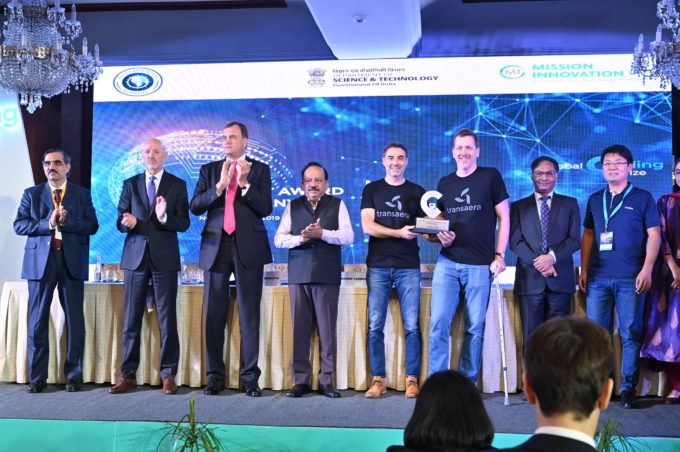Transaera’s connection to Greentown Labs starts long before Transaera ever began. Sorin Grama co-founded Promethean Power Systems, one of the four original companies that created Greentown. When Grama launched another cleantech-oriented company, he knew he wanted to build it at Greentown.
He also knew he wanted to work on refrigeration and collaborate with some of the talented people who helped design and manufacture Promethean’s breakthrough cooling technology. Enter Matthew Dorson, a longtime collaborator at Promethean, who Grama describes as “a technical wizard” who could take any of Grama’s ideas and turn them into practical, working products.
While working as an entrepreneur-in-residence at MIT, Grama met Mircea Dincă, a professor who researches novel materials, specifically metal-organic frameworks (MOFs). Grama was interested in how the MOFs, which are able to absorb humidity from the air, could be used for more efficient refrigeration.
Dincă and Grama also discovered an unexpected personal bond. They both grew up in Romania, in small towns just a few miles apart at the foot of the Carpathian Mountains.
Grama, Dincă, and Dorson founded Transaera in 2017 with a mission to bring new material science to bear and solve air conditioning’s energy efficiency problem. Transaera’s technology absorbs the humidity from a room before cooling the air, which is far more efficient. The product functions as an attachment for existing air conditioners.
The budding team of three chose to focus on the indoor farming market, an opportunity they discovered thanks to an NSF I-Corps grant that enabled them to do extensive market research. They found that cooling and dehumidification were major pain points for indoor farming—which relies heavily on air conditioning to counteract the lamps’ heat and the plants’ humidity.
Residential air-conditioning was always a future path for Transaera, but when the team came across the Global Cooling Prize—an international competition to tackle air conditioning’s environmental impact led by the Rocky Mountain Institute, the Government of India, and Mission Innovation—they decided to dive in.
“The reason air conditioning is inefficient, especially in hot and humid countries, is because when you cool the air, you’re also cooling the water vapor that’s in the air,” Grama explains. “That takes a lot of energy. If you can extract that water first, then you can cool the air more efficiently.”
Air conditioning is set to become the single largest user of electricity in buildings, overtaking appliances and plug loads. But current cooling technology is a significant problem for the environment—one that’s worsening as temperatures rise and air conditioning becomes a necessity, particularly in developing countries. In the United States, air conditioning emits roughly 100 million tons of carbon dioxide annually, according to a 2016 New York Times article.
Part of the issue, Grama explains, is that air conditioners’ fundamental technology hasn’t been updated in a century.
“Right now it’s not affordable for most people in developing countries, it’s not efficient, and the poor grid infrastructure in places like India cannot afford to allow these standard air conditioners to be installed. It will be a disaster as far as climate impact—there are all these harmful gases that are used, they consume a lot of energy, they create heat islands in cities,” Grama says of increased air conditioning use. “So something needs to be done.”
Transaera is one of eight finalists for the Global Cooling Prize and has received $200,000 to build and test a prototype over the next year. The prize’s criteria includes a 5x reduction in climate impact, measured by decreasing in energy reduction and harmful gases. The eight finalists were chosen from 139 applicants, and hail from India, China, Japan, the United Kingdom, and the United States.
“What makes this competition especially exciting is the market transformation opportunity,” Richard Branson, global ambassador for the Global Cooling Prize, said in a statement. “It could be one of the biggest technology-based steps we can take to affect climate change.”
“We’re very excited about this. Whether we win or not, this will be a great exercise,” Grama says. “We’ll have a prototype, we’ll have data. We have so much to gain out of this. And we’re looking at partnerships to actually deploy this technology at scale down the road. With the right partner, we can deploy these in tens of millions of units. There’s a big opportunity out there.”
The prize’s winner will be announced in late 2020 and will receive $1 million. Transaera’s team will spend 2020 focusing on building its prototype for the Global Cooling Prize and raising its first venture funding. Up to this point, Transaera has been entirely funded by grants, including from The Massachusetts Clean Energy Center and the National Science Foundation.
Transaera came to Greentown in February 2018, and takes advantage of the corporate partnerships, the prototyping lab, and the opportunity to collaborate with other members.
In the early days of Greentown, Grama secured National Instruments as a partner because he needed their products to build his prototypes. Now, eight years later, he doesn’t have to go far in his search for partners. Greentown already has about 50 partners, including Saint-Gobain, a company with deep expertise in material science. Grama notes that Transaera’s partnership with Saint-Gobain developed thanks to the corporate’s Materials Library in Greentown’s prototyping lab.
“That partnership came together because Saint-Gobain sits right there next to us,” Grama says, gesturing to the prototyping lab. “It’s this proximity and rubbing shoulders that sparks ideas, which is a value of Greentown.”
Greentown Labs is a community of bold, passionate entrepreneurs creating solutions for today’s biggest climate and environmental challenges. Located in Somerville, Mass., Greentown Labs is the largest cleantech incubator in North America, operating a 100,000 sq. ft. campus comprised of prototyping and wet lab space, shared office space, a machine shop, electronics lab, and a curated suite of programs and resources. Greentown Labs is home to more than 100 startups and has supported more than 230 since its inception.


